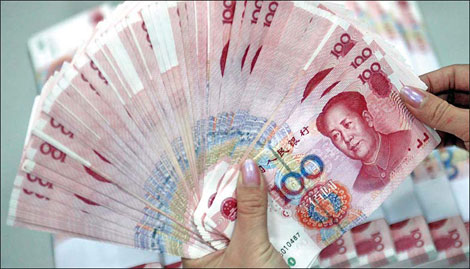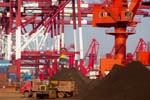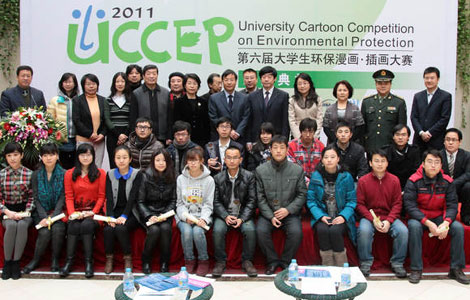New capital rules for banks 'delayed to H2'
Updated: 2012-01-05 08:00
By Wang Xiaotian (China Daily)
|
|||||||||||
|
A bank clerk counts yuan in Huaibei city, Anhui province. Experts say tougher criteria imposed on lenders will probably counter the effects of the official monetary policies. [Photo / China Daily] |
Current economic conditions said to lead officials to rethink timing
BEIJING - Implementation of the new, tougher criteria for commercial lenders set by the China Banking Regulatory Commission (CBRC) has been postponed to the second half of 2012 in response to current economic conditions and looser monetary policies, said an official on Wednesday.
A government source familiar with the matter told China Daily that the new standards would probably not be effective until July.
Cao Yuanzheng, chief economist at the Bank of China Ltd, said that there was a contradiction between banking regulatory policies and the nation's monetary stance, as banks might hesitate to lend in order to achieve capital criteria.
"Tougher criteria imposed on lenders will probably counter the effect of official monetary policies," said Cao, adding that tougher financial regulation had become a general trend.
"However, financial regulation has to act in concert with monetary policy to support the real economy, which actually produces goods and services," he said.
The CBRC announced earlier in 2011 new rules setting tougher criteria for lenders' capital adequacy ratios (CAR), which were to have taken effect at the beginning of 2012.
Large lenders were to achieve a CAR of 11.5 percent and a core CAR of 9.5 percent.
But the delay in implementing the new standards should not be construed as a loosening of financial regulation, said Lu Zhengwei, chief economist at the Industrial Bank Co Ltd.
"It is a normal counter-cyclical adjustment. When economic growth accelerates, it's necessary to require lenders to have a higher CAR than the international standard.
"When the economy has increasing downside risks, it's better to go back to the international criteria, which are still relatively high," he said.
"Excessively tough standards will affect banks' credit support to the real economy," said Wang Zhaoxing, vice-chairman of the CBRC, in December. Wang indicated that China would try to maintain a balance between international standards and domestic economic conditions.
The CBRC's delay in implementing the new rules cannot completely resolve the contradiction between lenders' capital shortages and the country's need to shore up the economy, said Li Wei, economist at the Standard Chartered Bank (China) Ltd.
"Although the financing demand of banks will show some decline as a result, accelerating capital outflows have added to the rising uncertainty surrounding market liquidity."
Chinese commercial lenders also face increasing capital pressure due to deposit drains, and they will continue to seek refinancing channels in 2012, as relatively looser credit controls will prompt lenders to extend more credit and increase their capital consumption, said Qiu Zhicheng, an analyst at Guosen Securities Co Ltd.
"For monetary policies, it's like sailing without wind," Qiu said.
China's listed lenders may need to raise more than 100 billion yuan ($15.78 billion) through equity financing next year to replenish their capital, local media have reported.
Yan Qingmin, assistant chairman of the CBRC, said earlier that capital replenishment through issues of subordinated debt and other methods would face stricter restrictions.
- Analysts: IPOs to remain common in 2012
- Sinochem to look for oil in deep waters
- Audit finds 'questionable' local govt transactions
- More trade frictions expected in 2012
- New capital rules for banks 'delayed to H2'
- PBOC to regulate RQFII programs
- Foreign trade to top $4.8t in 2015
- Fake peanut oil seized from shelves










